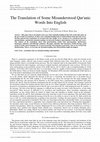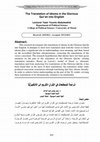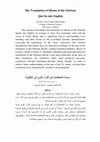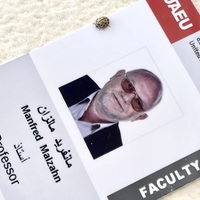Papers by Yasir Al-Badrany
Mağallaẗ buḥūṯ al-luġaẗ, Mar 31, 2024
This paper investigates the concept of "Equal Authenticity in Legal Translation" and explores the... more This paper investigates the concept of "Equal Authenticity in Legal Translation" and explores the nature, strategies, and skills crucial for translators to successfully produce such equally authentic texts from English-Arabic or vice versa. The focus of this study is on the significant features that constitute legal texts, providing an examination of various categories of legal documents prevalent in diverse contexts. Through a detailed descriptive analysis, the paper illustrates the noteworthy effectiveness of these categories and demonstrates how legal translators can apply their skills to address challenges inherent in legal translation. The paper elucidates the complexities of this demanding task
College Of Basic Education Researches Journal, 2013
College Of Basic Education Researches Journal, 2009

Theory and Practice in Language Studies
This paper aims to investigate some cases where misunderstanding of Qur'anic words takes plac... more This paper aims to investigate some cases where misunderstanding of Qur'anic words takes place on the part of Qur'an translators. In these cases, misunderstanding leads to mistranslation of the Qur'anic verses. Having analyzed nine translations of seventeen Qur'anic sample verses, relying on two well-known Qur'anic interpretations, considerable misunderstanding was detected, leading to mistranslation of the Qur’anic verses. The analysis of the translations shows that mistranslation results from misconception, misreference, homonymy confusion, and inflection confusion. The paper concludes that translators, besides having a good grasp of Arabic source language (SL) in general and Qur’anic language in particular, have to rely on Qur'anic interpretation, Tafseer, to overcome any misunderstanding, thus mistranslation might not happen.
Theory and Practice in Language Studies
This study investigates the rate of unawareness of common errors in English and its impact on hum... more This study investigates the rate of unawareness of common errors in English and its impact on human vs. machine translation into Arabic. It analyzes the reaction of human and machine translators when encountering English sentences with common errors, and its impact on translation process. Translators are readers in the first place, they have to comprehend what they read in the SL in order to convey it in the TL. In order for the ST message to be correctly conveyed into the TL, detecting errors and correcting them before translating is a necessity. The study is conducted through presenting 40 SL texts and evaluating their 680 TL texts translated by 14 MA students of translation and 3 online machine translators. Results show that the rate of unawareness of common errors is 51% for human translators and 79% for machine translators.
College Of Basic Education Research Journal

This research investigates the translation of idioms in the Glorious Qur' n into English. It atte... more This research investigates the translation of idioms in the Glorious Qur' n into English. It attempts to show how translators deal with the verses in which idioms play a significant role in understanding verse meaning, and then, based on the accredited Qur' nic interpretations, correcting the translations of the verses concerned. The research hypothesizes that idioms have not been given attention on the part of the translators of the Glorious Qur' n, causing translation mistakes. Based on Larson s model of literal vs. idiomatic translation and from analyzing five translations of the Glorious Qur' n, it has been found that, in the most of their translations, the translators under study produced inaccurate translations through translating Qur nic idioms literally. In order to achieve better understanding on the part of the TL reader, revising these translations to be idiomatically oriented is recommended.
This research investigates the translation of in the Glorious Qur' n into English. It attempts to... more This research investigates the translation of in the Glorious Qur' n into English. It attempts to show the way translators have rendered it, and then, based on the accredited Qur' nic interpretations, correcting the translations of the ayas concerned. The research hypothesizes that treating single the same way as the collocated leads to erroneous translation. From analyzing five translations of in the Glorious Qur' n, it has been found that the translators produced inaccurate translations as far as collocated is concerned. In order to achieve better understanding on the part of the TL reader, revising these translations is recommended.
This research investigates the translation of pronouns in the Glorious Qur'an into English. Based... more This research investigates the translation of pronouns in the Glorious Qur'an into English. Based on the Qur'anic interpretations, the research tries to examine how translators of the Glorious Qur'an deal with pronouns and their antecedents by checking the accuracy of their renderings. It is found that pronouns are given little attention on the part of translators. Hence, revising translations, as far as pronouns are concerned, is strongly recommended. اﻻﻧﻛﻠﯾزﯾﺔ اﻟﻰ اﻟﻛرﯾم اﻟﻘرآن ﻓﻲ اﻟﺿﻣﺎﺋر ﺗرﺟﻣﺔ اﻟواﺣد ﻋﺑد ﯾوﻧس ﯾﺎﺳر م.م. اﻟﺳﯾﺎﺳﯾﺔ اﻟﻌﻠوم ﻛﻠﯾﺔ -ا ﺟﺎﻣﻌﺔ ﻟﻣوﺻل
The research tackles formal and functional meanings in the Glorious Qur'an with reference to tran... more The research tackles formal and functional meanings in the Glorious Qur'an with reference to translation. It aims at studying how translators deal with these meanings in their renderings, and based on the accredited Qur'anic interpretations, it tries to clarify the Qur'anic verses, as far as these meanings are concerned. It is hypothesized that unless a fine distinction is made between formal and functional meanings, erroneous translation will result. Analyzing different translations of the Glorious Qur'an, it is realized that taking these meanings into consideration plays a significant role in achieving better understanding on the part of the TL reader. Thus, revising these translations is recommended.
This research investigates the impact of inflections on translating some Qur' nic verses into Eng... more This research investigates the impact of inflections on translating some Qur' nic verses into English. It attempts to show how translators deal with the verses in which inflection plays a big role in altering the verse meaning, and then, based on the accredited Qur' nic interpretations, correcting the translations of the verses concerned. The research hypothesizes that the issue of inflection has not been given attention on the part of the translators of the Glorious Qur' n, causing translation mistakes. From analyzing five translations of the Glorious Qur' n, it has been found that the translators produced inaccurate translations as far as the issue of inflection is concerned. In order to achieve better understanding on the part of the TL reader, revising these translations is recommended.

This research investigates the translation of idioms in the Glorious Qur'ān into English. It atte... more This research investigates the translation of idioms in the Glorious Qur'ān into English. It attempts to show how translators deal with the verses in which idioms play a significant role in understanding verse meaning, and then, based on the accredited Qur'ānic interpretations, correcting the translations of the verses concerned. The research hypothesizes that idioms have not been given attention on the part of the translators of the Glorious Qur'ān, causing translation mistakes. Based on Larson's model of literal vs. idiomatic translation and from analyzing five translations of the Glorious Qur'ān, it has been found that, in the most of their translations, the translators under study produced inaccurate translations through translating Qur'ānic idioms literally. In order to achieve better understanding on the part of the TL reader, revising these translations to be idiomatically oriented is recommended.











Uploads
Papers by Yasir Al-Badrany